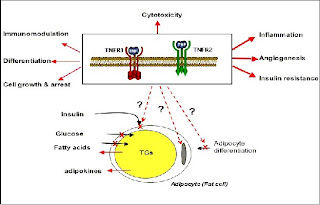Cytokine Signalling and Energy Homeostasis:
Historically, cytokines have attracted much interest due to their ability to induce cellular demise. This toxicity often requires high circulating levels, as is observed during ischemia-reperfusion damage, graft-versus-host disease, cerebral malaria, sepsis, cachexia and cancer. However, chronic exposure to low levels of cytokines can also exert profound effects. These latter actions have been shown to alter multiple cellular functions and may play a physiological role in regulating cellular metabolism, tissue development, thermo genesis and appetite. The research interests focus on the actions of the prototypical cytokine, TNF alpha and the signalling mechanisms by which its actions are manifested in adipose tissue.
TNF alpha (Tumor Necrosis Factor alpha) is a multifunctional cytokine that mediates its effects via two cell surface receptors. These are ubiquitously expressed and differ primarily in their intracellular signalling domains. Both TNF and its receptors are produced by adipose tissue where it can affect normal adipocyte development as well as key functions such as insulin sensitivity, triglyceride storage and release and adipokine production. These actions can themselves go on to impact on systemic sites and alter whole body energy homeostasis. Understanding how TNF signals in adipocytes is important if we wish to identify novel targets for therapeutic intervention in obesity-related metabolic disorders. To this end, scientists currently investigating the mechanisms of TNF signalling in insulin resistance, adipocyte development and gene expression.
Historically, cytokines have attracted much interest due to their ability to induce cellular demise. This toxicity often requires high circulating levels, as is observed during ischemia-reperfusion damage, graft-versus-host disease, cerebral malaria, sepsis, cachexia and cancer. However, chronic exposure to low levels of cytokines can also exert profound effects. These latter actions have been shown to alter multiple cellular functions and may play a physiological role in regulating cellular metabolism, tissue development, thermo genesis and appetite. The research interests focus on the actions of the prototypical cytokine, TNF alpha and the signalling mechanisms by which its actions are manifested in adipose tissue.
TNF alpha (Tumor Necrosis Factor alpha) is a multifunctional cytokine that mediates its effects via two cell surface receptors. These are ubiquitously expressed and differ primarily in their intracellular signalling domains. Both TNF and its receptors are produced by adipose tissue where it can affect normal adipocyte development as well as key functions such as insulin sensitivity, triglyceride storage and release and adipokine production. These actions can themselves go on to impact on systemic sites and alter whole body energy homeostasis. Understanding how TNF signals in adipocytes is important if we wish to identify novel targets for therapeutic intervention in obesity-related metabolic disorders. To this end, scientists currently investigating the mechanisms of TNF signalling in insulin resistance, adipocyte development and gene expression.
